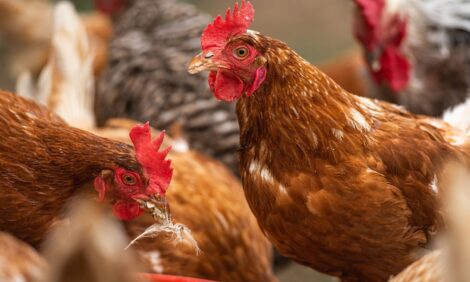



Biodiesel byproduct fuels growth in broilers
ARKANSAS - Glycerine, a byproduct of biodiesel production, can be used as a dietary supplement for growing broiler chickens, according to research by University of Arkansas Division of Agriculture poultry scientists.Finding valuable new uses for glycerine will become increasingly important as biodiesel production increases, said Park Waldroup, poultry nutritionist for the U of A Center of Excellence for Poultry Science.
“There is a rapid increase in the production of biodiesel in the United States, with about 354 million gallons produced annually and additional plants under construction that will nearly double U.S. production capacity,” Waldroup said. “Glycerine, a carbohydrate molecule that makes up 10 to 12 percent of a typical fat, is a byproduct of the manufacture of biodiesel from fats and oils.”
The growing production of biodiesel will soon overwhelm traditional uses for glycerine in cosmetics and other products, Waldroup said. So he and his research group are exploring the value of glycerine as an energy source in typical U.S. broiler diets.
“Glycerine is recognized as a safe feed additive,” Waldroup said. “It is a pure calorie source that can provide energy to a body for maintenance and growth.”
In a short-term preliminary study Waldroup and his research group found that they could feed up to 10 percent glycerine to chicks up to 16 days of age without impairing performance. This was followed by a full-term feeding study with chicks grown to market age to evaluate the effects not only on live performance but also on meat quality.
“Results of the study showed that diets with 5 percent glycerine supported good performance, but when 10 percent was added to the diets the flow rate of the feed was slightly reduced, hampering feed intake,” Waldroup said. “Neither level of glycerine had any adverse effects on meat quality.”
Results of these studies indicate that glycerine can be used as an energy source for broiler diets, Waldroup said, but additional research is needed to evaluate quality issues associated with its use and the effects on such features as feed texture and pellet quality.
“As the biodiesel industry continues to grow, this should provide additional feed sources for broiler producers and improve profitability of biodiesel production,” Waldroup said.
ThePoultrySite News Desk









